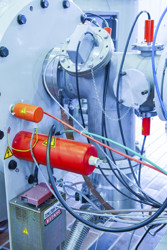Ion beam research in Greece
Hosted by the Institute of Nuclear Physics, the only heavy ion accelerator in Greece generates a beam of charged particles and accelerates them to one tenth the speed of light. These are used on samples to non-destructively test authenticity and the condition of historical artefacts. Besides analysing artworks, the concentrations of organic elements in soil samples and trace elements in human tissues are also estimated. The EU-funded 'Center of excellence in low-energy ion-beam research and applications' (LIBRA)(opens in new window) project was initiated to unlock the full potential of the Tandem Accelerator Laboratory. Highly qualified young scientists were recruited. Furthermore, mobility of researchers was encouraged to facilitate the exchange of know-how and expertise with partner institutions. To improve infrastructure, state-of-the-art equipment was acquired to allow the laboratory to participate in large European research networks at the forefront of ion beam research. Equipment obtained includes an electrostatic nuclear accelerator for the analysis of nanomaterials. In addition, the existing infrastructure was upgraded to allow the implementation of new nuclear techniques for research in biomedicine and environmental monitoring. Scientific events organised during the course of the LIBRA project contributed to the visibility of the Tandem Accelerator Laboratory's in the international scientific community. Among them was the 69th Meeting of the Nuclear Physics European Collaboration Committee (NuPECC) held on 8th and 9th of October 2010. NuPECC is an expert committee of the European Science Foundation (ESF) that plays a decisive role in the formation of science policy in Europe. Through the LIBRA project, the laboratory reinforced its existing collaborations with leading research centres, such as the European Organization for Nuclear Research. Besides attracting scientists from abroad, increased research capacity led to the creation of new research centres in Greece to exploit its modern facilities.



